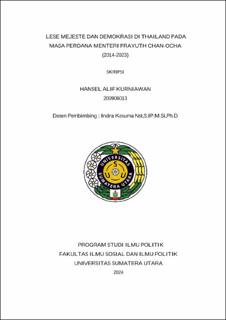| dc.description.abstract | This thesis is motivated by analyzing the application of lese majeste laws in Thailand during the reign of Prayuth Chan-o-cha, who has served as Prime Minister since the 2014 military coup. The current King of Thailand is Maha Vajiralongkorn, known by the title Rama X. He is the only son of King Bhumibol Adulyadej and Queen Sirikit. Vajiralongkorn ascended the throne on October 13, 2016 and was crowned on May 4, 2019. He has immense wealth and is notorious for his controversial personal life, including marriages to several wives and personal bodyguards who were later elevated to queen. King Vajiralongkorn has an important role in Thailand's lese-majeste law. This law prohibits criticizing or insulting the king and his family, and violations are subject to very severe penalties. King Vajiralongkorn himself has faced several lese-majeste cases, and the Thai government often uses this law to crack down on his critics. Thailand's Lese Mejeste law, which prohibits insulting the royal family, has become a controversial tool in the country's political and social dynamics. This study explores how this law is used to silence political opposition and control public discourse, as well as its impact on freedom of expression and human rights. Using qualitative methods, including legal document analysis, as well as a review of prominent lese majeste cases, this study found that the application of this law under the Prayuth Chan-o-cha administration has significantly increased. The results show that the use of lese majeste laws has strengthened government control over society and deepened political polarization in Thailand. The findings emphasize the need for legal reform to protect freedom of expression and ensure justice for all citizens.
Lese Majeste is a law in Thailand that prohibits insulting the Thai monarchy. This law is used to prevent insults against King Maha Vajiralongkorn and his immediate family. Lese Majeste is considered one of the harshest laws in the world, with prison sentences of up to 15 years for anyone found defaming, insulting or threatening King Maha Vajiralongkorn and his immediate family. The use of Lese Majeste in Thailand has caused controversy and criticism from various parties. Several human rights organizations and pro-democracy groups have called for the reform of this law, arguing that it restricts freedom of expression and free speech. The Thai government, on the other hand, argues that the law protects the King and the monarchy, as well as national security. | en_US |


